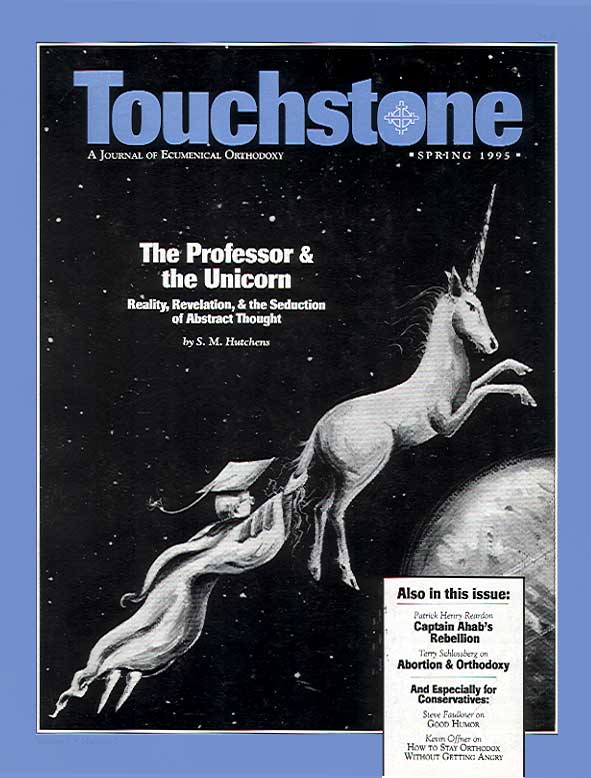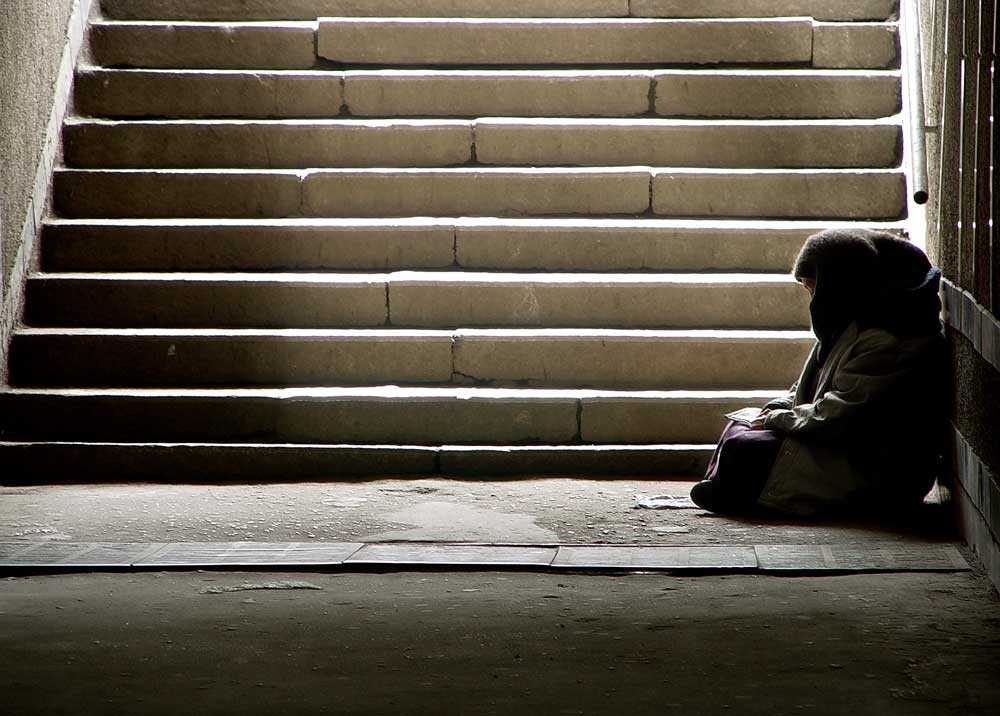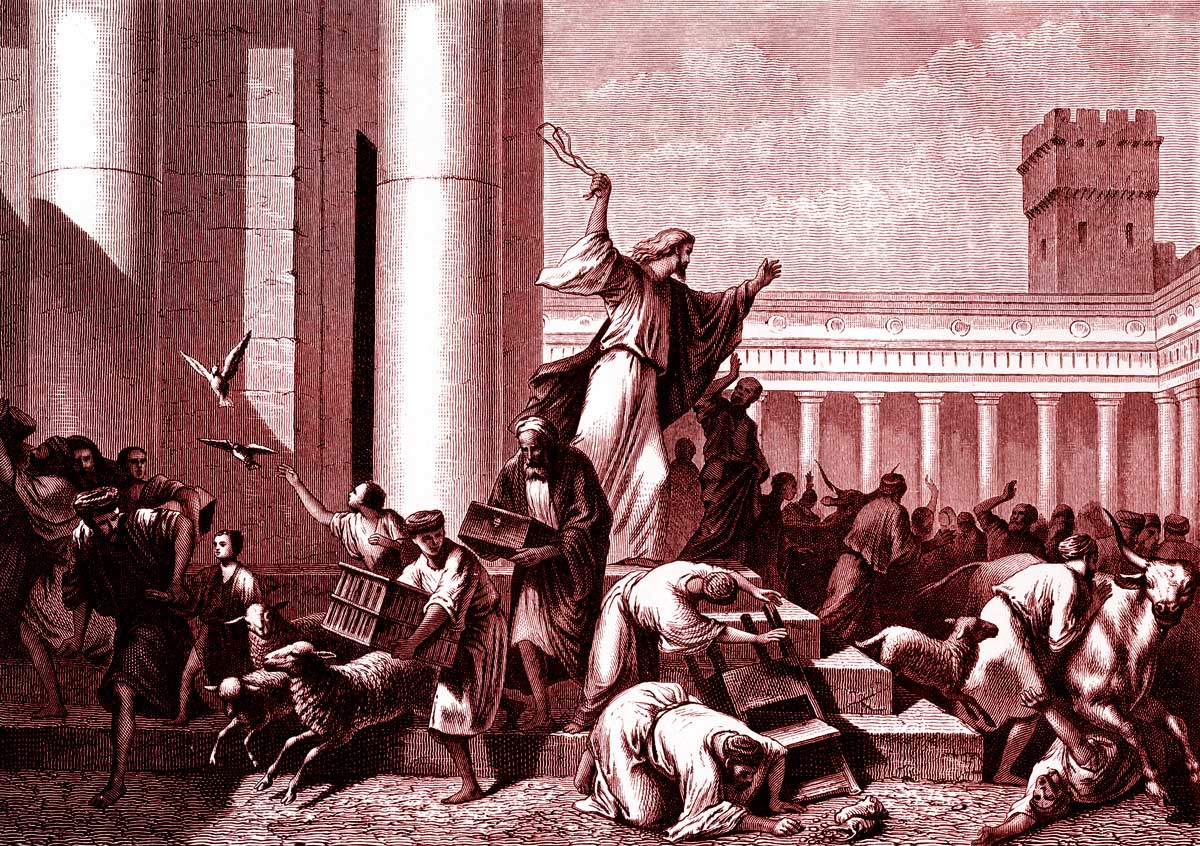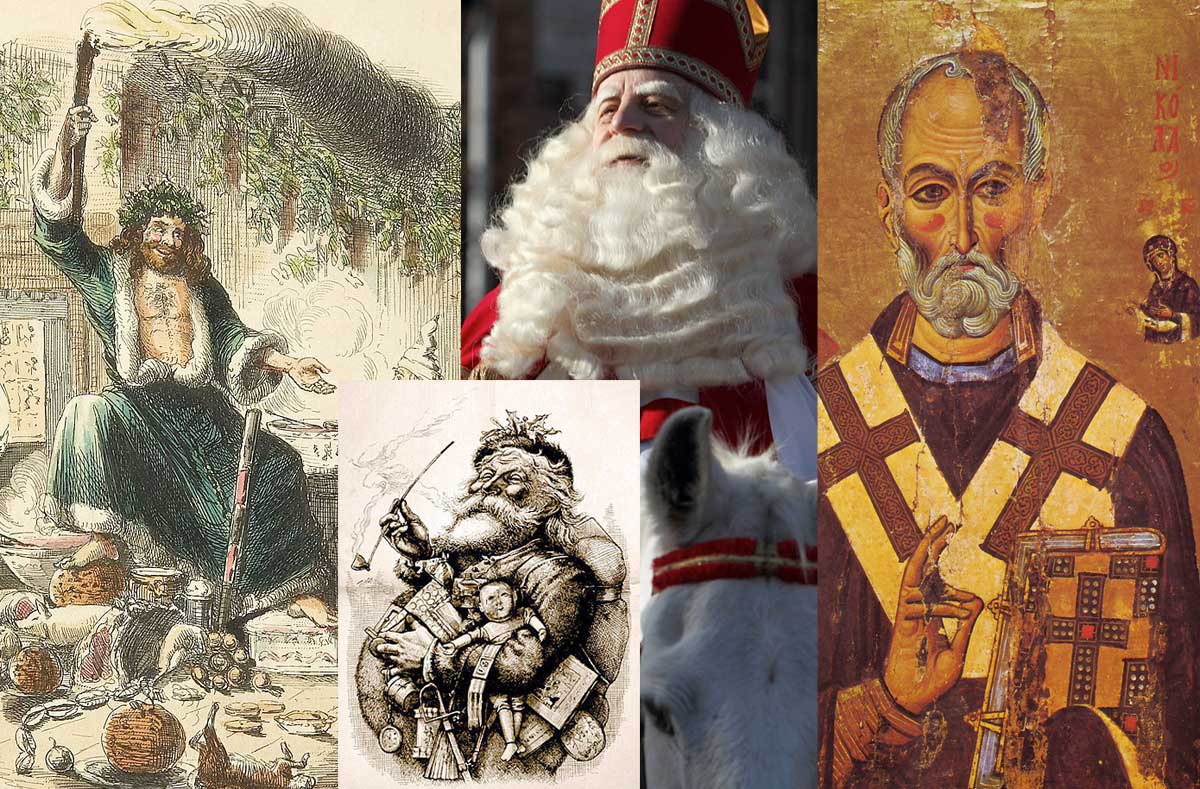The Brothers Grim
Humorlessness Among the Religious and the Irreligious
by Steven Faulkner
Aristotle said that on one side stands the boor who never says anything funny and takes offense at those who do. On the other side stands the buffoon who jokes at everything and “will not keep his tongue off himself or anyone else.” In between is the eutrapelia, the “well-turning” person who stands between the extremes, who can turn to things serious and in good time turn to things jovial as the occasion requires.
Father William Lynch, a famous analyst of humor, places alongside the boor other fierce and serious souls who don’t know how to laugh: the heretic, “who sees all reality as simple and reduces a multitudinous creed to a single, exacerbating, crusading formula”; next is the scrupulous man, “who reduces the overflowing of being and the mind to a worrisome pin point”; and finally the great conquerors “who have the universe under perfect control and have it forever fixed in an icy stare.” Why Father Lynch limits his list to these is unclear, for one can go on and on, listing troops of bitter and malicious types who mutter and bicker in the ranks.
But there are two humorless spirits that I wish to exorcise here. First there is the “religious” man who thinks that laughing is somehow not religious, and second, there is the irreligious man whose ideologies leave no room for laughter. These two are brothers: their father is pride and their prim mother is principle.
The religious brother has decided that the obligations of things divine so weigh us down that we have no time for humor. Everything is serious; our eternal souls are at stake. Why squander eternity for a burst of laughter? It is a trivial diversion, a literal striving after wind. He is a most sincere soul who, like William Bradford, governor of Plymouth Colony forbade “gaming and reveling” on Christmas Day and thought that it was holier to cut timber on the day of our Lord’s birth than to cut up a Christmas turkey or to cut a caper in the streets. The Quaker Robert Barclay wrote:
It is not lawful to use games, sports, plays, nor among other things comedies among Christians, under the notion of recreations, which do not agree with Christian silence, gravity, and sobriety; for laughing, sporting, gaming, mocking, jesting, vain talking, etc., is not Christian liberty, nor harmless mirth.
This pious fever infects not only Puritans, though they may be particularly susceptible, but also imprisons devout Catholics and Protestants of all stripes. Awed by Sin, Death, Final Judgment, Hell, Heaven, Predestination, Eschatology, Ecclesiology, Devils, Neighbors, and Ineluctable Damnation, they eschew laughter. “Sorrow is better than laughter,” sayeth the Preacher. “It is better to go to the house of mourning than to the house of feasting” (Eccl. 7:2,3).
I must admit that we do not find much laughter in the Bible. Perhaps, as G. K. Chesterton wrote in his famous ending to Orthodoxy, “There was some one thing that was too great for God to show us when He walked upon our earth; and I have sometimes fancied that it was his mirth.” Some even have argued that Jesus was not hiding his mirth—a camel squeezing through the eye of a needle or extracting one’s eye to avoid lust is somehow humorous. But I have remained unconvinced by arguments that Jesus was a funny man and we just lose it in translation or miss it because of our solemn expectations. There is, as the Preacher also says, “a time to weep, and a time to laugh; a time to mourn, and a time to dance.” When God Incarnate walked the dusty roads of Judea and Galilee we might make allowance for the disciples if they responded in either ignorance or awe, as they did, rather than in mirth. Peter often put his foot in his mouth, but not intentionally. I think Reinhold Niebuhr was right when he said:
Laughter must be heard in the outer courts of religion, and the echoes of it should resound in the sanctuary; but there is no laughter in the holy of holies. There laughter is swallowed up in prayer and humour is fulfilled by faith.
But if, in the presence of the King of the Universe, we should bow in reverence, in the outer courts, in the presence of our fallible fellows, we might be excused for laughing. For both we and our fellows are funny precisely because we are fallible. Only the proud man or the desperately religious man refuses to laugh with his fellows; the one refuses to recognize his foibles, the other considers his failures sins and not a laughing matter. In the Catholic tradition, such painstaking self-examination is called scrupulosity and is itself considered a sin.
But the humble man recognizes that not all imperfections are sinful. The humble man can laugh at himself. During the First World War, an indignant lady once asked the corpulent Chesterton why he was not out at the front. To which he replied calmly, “Madam, if you go round to my side you will see that I am.” Humor and humility are connected. Chesterton saw this clearly: “Humour always has in it some idea of the humorist himself being at a disadvantage and caught in the entanglements and contradictions of human life.” One almost might say that (excluding the saintly, whose kindness and love have perhaps overcome even the comic) humor is one of the marks of a good man. Evil men may laugh, but there is something fiendish in their laughter.
Of course not everything is comical. Only the cynic laughs at everything and sees nothing as sacred. But without the sacred, the holy, the True, comedy loses its punch. For the comic is based on standard expectations, that is, expectations of a standard. Unless we recognize a standard, we cannot be surprised by a deviation or struck by an aberration. It is Old Man Custom who fathers all the little comedies who scamper about tickling ribs and wreaking havoc with their father’s rules and regulations. Only when we recognize a custom do we notice the incongruous; only when we understand the ritual do we notice the thwarted rubric. One must understand the language to laugh at a mispronunciation. My father, as a young missionary in Africa, once preached an earnest sermon in which he adjured the congregation several times to go from there and pray, using a certain word of the Dinka tongue to express his conviction. The Dinka pastor later quietly advised my father that he had just been encouraging everyone to repair to the forest and relieve their bodily functions. This, he said, with a glimmer in his eye, they were most willing to do, though they were uncertain of its spiritual significance.
Tradition, Custom, Ritual—these are the foundations of comedy. For this reason, religion, as the conservator of traditions and standards, supplies great opportunities for humor. Only when the standards break down everywhere does humor become shallow. Universal chaos is not funny; it is terrifying. When a trumpeter steps left when the whole band is stepping right, we laugh. But when the whole band, without uniform, wanders all over the field and into the stands playing whatever suits each member, we stop laughing and leave. Stand up comics seem to be having a harder time making people laugh these days because we have divorced Old Custom. It was easier for Charles Dickens or Elizabeth Gaskell or Anthony Trollope to draw humor from Victorian culture simply because Victorian culture had standards.
But there is that second grim brother, the irreligious ideologue. And I fear he has grown much heavier and more verbose than his languishing religious brother, at least in the United States. Gone are the days when the general society took the serious fundamentalist or orthodox Christian very seriously. But his highly respected ideological brother has come upon us with a vengeance. He has left the conservative garb of his fathers and has dressed himself in a hundred new ideologies. Everywhere he struts his new clothes and demands that everyone wear his environmentally-safe, gender-neutral, non-smoke-impregnated, neither wine-stained, nor animal-pelted, nor minority-biased, condom-equipped, organically-grown, multiculturally sensitive-but-American-stitched spandex. This brother, whose name is Legion, may allow humor a place in society, but only if put to proper work.
I will use George Bernard Shaw as an elder brother of this type of humorous humorlessness. He was a contemporary of Chesterton, whose arguments and humor counteract him. Louis Biancolli wrote that George Bernard Shaw “has never been the slave of his vast sense of humor. Always it has been at the service of a great conviction. Behind the buffoon has towered the thinker and the humanitarian.” Beware of humanitarians—they are a ferocious lot. Shaw may never have been slave to his vast sense of humor, but it seems he would subject humor to slavery and send him out only on polemical errands. Shaw detested the comic operas of Gilbert and Sullivan precisely because they did not carry positive social commentary. He criticized Oscar Wilde’s The Importance of Being Earnest because it was not sufficiently earnest. For Shaw, comedy is wasted on humor. It is rather a grave undertaking: it must serve a high moral purpose; it must educate, illuminate, indoctrinate, inoculate, but never just make a man laugh.
To which point Chesterton says, “I do not like seriousness. I think it is irreligious. Or, if you prefer the phrase, it is the fashion of all false religions. The man who takes everything seriously is the man who makes an idol of everything. . . .” Though this is a case of Chesterton’s usual hyperbole, still he does have a point. The man consumed by his ideals has no time for nonessentials. The humanitarian who cuts himself away from Faith and Tradition must redefine the world, persuade the population, reorganize, reinterpret, rebuild. The reformer has the monumental responsibility of reinventing humanity. Shaw was such a man, taking upon himself the task of revising religion, politics, social structures, literary genres, family values, and even diet (he was a vegetarian).
Shaw certainly did have a sense of humor, but there is something out of balance in a man who will not permit himself to enjoy his own laughter. In a review of The Importance of Being Earnest, Shaw censures his own reaction to the comedy:
though I laugh as much as anybody at a farcical comedy, I am out of spirits before the end of the second act, and out of temper before the end of the third, my miserable mechanical laughter intensifying these symptoms at every outburst.
It is a rather humorous scene: the great George Bernard Shaw heaving with laughter and hating every minute of it because, as he says in the review, the humor has no moralizing point.
Our generation is filled with moralizing humanitarians who storm about descanting on every airwave, crying foul whenever someone laughs at their antics. They are ideologues who have abandoned the time-honored beliefs, the quiet customs that have held society together. These idealists have attempted new foundations, self-made ideals. Everywhere the cry is for change, reform, new ideas, improvement. And they are deadly serious about it and do not relish us poking fun at their inconsistencies. They simply cannot allow a contradiction because to allow a contradiction cuts at the self-made standard they stand upon.
“You Puritans,” Chesterton once said to Shaw,
fashion God in your own image. You conceive the truth to lie in yourselves. You would not be content merely to remold the world nearer to the heart’s desire; you would recast it entirely to the highbrow’s dream. The magnificence of uncertainty, the splendor of ignorance, the sublime impossibility of Nature, the marvel and mystery of this miraculous and ridiculous thing called Life—all this is lost on you. It is lost on you because yours is a world of rush, not rolic, where the station hotel has usurped the wayside tavern, where the draught of beer has given place to the sip of bovril, and where Shakespeare and Homer have been run to earth by Sherlock Holmes.
Bovril is a hot, foul-tasting drink that’s supposedly good for you. And all these new mothers of invention never tire of forcing it down our despairing throats. Feminists, Environmentalists, Gays and Lesbians, Cutthroat Capitalists, Still-believing Socialists, Minority Rights Activists, Pro-Choicers, Kevorkians, Free Speechers hobnobbing with the Speech-Police, Calorie Counters, Smoke Renouncers, Whale Preservers, Product Observers—all of them so very, very angry and self-righteous.
And oh yes, they often have just cause for their anger. But must we always be angry? Is there no time for laughing? St. Francis De Sales wrote:
Cassian tells us that a hunter once found St. John the Evangelist holding a partridge in his hand and amusing himself by stroking it. When the hunter asked him how so great a man could waste his time in such a trivial way St. John replied: “Why do you not carry your bow always taut?” “Because,” replied the hunter, “it would then lose its resilience, and so be rendered useless.” “Do not be surprised then,” said the Apostle, “if I sometimes relax my mind and take a little recreation so that afterwards I may concentrate the better.”
But who can stroke a partridge today? Why, the Environmentalists would have your hide. And who can rest by the wayside tavern and sing songs of cheer while all about us this earth-moving equipment roars through the steepled churches, the oak-beamed taverns, and the pillared halls of state, ripping out the old foundations and hastily and madly throwing up the new and barren innovations of the futurists? Who can be at rest in a world of self-made standards? The only one who can laugh comfortably at the “magnificence of uncertainty, or the splendour of ignorance” is the one who can rely upon a deeper certainty, an eternal knowledge not of one’s own making. Such men and women have the security to marvel at and to make merry over the inconsistencies of life. C. S. Lewis said,
The sun looks down on nothing half so good as a household laughing together over a meal, or two friends talking over a pint of beer, or a man alone reading a book that interests him; and . . . all economics, politics, laws, armies, and institutions, save insofar as they prolong and multiply such scenes, are a mere ploughing of the sand and sowing of the ocean, a meaningless vanity and vexation of the spirit.
Without doubt there are battles to be fought and weighty matters to be addressed. Mourning and Sorrow, those harrowing agents of spiritual correction, will seek us out in their own time. But we should learn from the good Apostle to stroke partridges, or perhaps we might just come in out of the storm and take refuge with good friends round a blazing fireplace, sip good wine, tell old stories, and laugh. And leave the Brothers Grim to rage and thunder out of doors.
Contributing Editor Steven Faulkner’s previous Touchstone articles include “Smoking His Own Breath: Walt Whitman & the Dead End Poets” (Winter 1992) and “Poor Myshkin: Dostoevsky’s Failed Fool-in-Christ” (Winter 1990). He is in the doctoral program in English at the University of Kansas. A Roman Catholic, he lives with his wife, Joy, and their seven children in Topeka, Kansas.
Steven Faulkner teaches creative writing at Longwood University in southern Virginia. He is the author of Waterwalk: A Passage of Ghosts (2007) and Bitterroot: Echoes of Beauty and Loss (2016). Both books are memoirs of father-son journeys that followed the paths of missionary priests: Marquette (in Waterwalk) and De Smet (in Bitterroot).
subscription options
Order
Print/Online Subscription

Get six issues (one year) of Touchstone PLUS full online access including pdf downloads for only $39.95. That's only $3.34 per month!
Order
Online Only
Subscription

Get a one-year full-access subscription to the Touchstone online archives for only $19.95. That's only $1.66 per month!
bulk subscriptions
Order Touchstone subscriptions in bulk and save $10 per sub! Each subscription includes 6 issues of Touchstone plus full online access to touchstonemag.com—including archives, videos, and pdf downloads of recent issues for only $29.95 each! Great for churches or study groups.
Transactions will be processed on a secure server.
more from the online archives
calling all readers
Please Donate
"There are magazines worth reading but few worth saving . . . Touchstone is just such a magazine."
—Alice von Hildebrand
"Here we do not concede one square millimeter of territory to falsehood, folly, contemporary sentimentality, or fashion. We speak the truth, and let God be our judge. . . . Touchstone is the one committedly Christian conservative journal."
—Anthony Esolen, Touchstone senior editor









